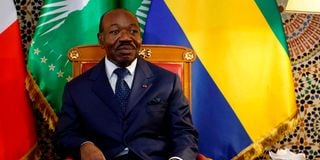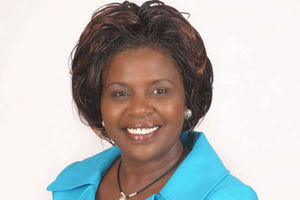Bongo ouster leaves elderly neighbours sitting on knife-edge

Gabon's ousted president Ali Bongo Ondimba. PHOTO | AFP
The ouster of Gabon’s President Ali Bongo this week has put his neighbours in an awkward position. Mr Bongo, 64, was deposed by his military on Wednesday, moments after his re-election victory was declared by the local electoral commission.
But even as it is condemned by world leaders, the popularity of the coup among civilians has sent shock waves across the region in a neighbourhood where leaders have cumulatively been in power for more than 100 years, the longest average on the continent.
Like Bongo, leaders of Cameroon, Equatorial Guinea and the Republic of Congo have always claimed victory at every election in the past two decades or more, even though observers had held a different view.
Whether by coincidence or design, President Paul Biya of Cameroon reshuffled his defence leadership hours after the military announced the takeover in Gabon.
A day later, Yaoundé said in a statement that it has “learnt with concerns” events that happened in Gabon on August 30, condemning ongoing “anti-constitutional change of government” that violates fundamental principles and values of CEMAC, the central African monetary bloc.
Biya, like his neighbours, lead in a region where flawed elections are common complaints.
In Gabon, the military said the elections there “did not meet the threshold for a transparent, credible and inclusive ballot so much hoped for by the people of Gabon.” Those had been complaints since Biya first took power but the military hadn’t been involved yet.
Three of the six CEMAC heads of state have cumulatively spent over a century in power.
Teodoro Obiang Nguema Mbassogo, 81, has been in power for 44 years since becoming the second of Equatorial Guinea in 1979. Biya, 90, has been a serial election winner albeit reports of rigging since Cameroon organised its first multi candidate election in 1992.
He is always described as second longest ruling president in Africa, the current longest consecutively serving non-royal national leader in the world, if his seven years as Prime Minister were added, and the oldest head of state in the world.
In the Republic of Congo, Denis Sassou Nguesso has been in power since becoming the seventh president of the country in 1997. He had a first five-year term from 1979 until 1992.
The president of the bloc, Central African Republic’s Faustin Archange Touadera in a statement said that all anti-constitutional government changes “constitute an intolerable violation of the founding principles of the community.”
Touadera, 66, came to power in 2016 and was re-elected in 2020. He is already being heavily criticised for organising a constitutional referendum that abolishes the two-term limit and clears him to run again and increases the term from five to seven years among others.
Gen Mahamat Idriss Deby of Chad is youngest among all head of states of CEMAC both in age and time spent in office.
The 39-year-old succeeded his late father killed on the battlefront in April 2021. He has since been president of the military junta and controversially extended the transitional period by two years from august last year.
On Thursday, Presidents Joao Lourenço of Angola and Nguesso held what they called urgent meeting over Gabon coup. Angola and Congo along with Gabon are member states of the Economic Community of Central African States (ECCAS).
Condemnation chorus
The ECCAS brings together other members such as Burundi, Cameroon, the Central African Republic, Equatorial Guinea, the Democratic Republic of Congo, Rwanda, Sao Tome and Principe and Chad.
The Angola and Congolese leaders were joined by Presidents of CAR, Equatorial Guinea in a video conference, according to the Angola State TV. Rwanda and Sao Tome Prime Ministers along with the ECCAS Commission head also attended the meeting by the video conference.
They condemned the coup, joining the African Union in rejecting the illegal changes in government.
“The two heads of state unequivocally condemned the seizure of power by force and urged respect for the physical integrity of President Ali Bongo Ondimba, his family and loved ones, as well as senior officials in state institutions,” a statement from the Angolan Presidency said.
“The two heads of state urged all parties concerned to prioritise political paths to preserve the peace, unity and serenity of the Gabonese people,” it added.
Angola says it also has also has a say on the continent as President Lourenço is currently the chair of the International Conference on the Great Lakes Region (ICGLR) and the AU champion for Peace and Reconciliation in the continent.
On Wednesday, President Lourenço asked during the swearing in of the newly appointed Deputy Director-General of the Foreign Intelligence Service to pay special attention to the “increasingly troubled” conflicts in the world, giving the example of the instability in Gabon.
In his capacity as the ICGLR chair, president Lourenço said he will work with other member states to find practical solutions to contain possible coups on the continent.
Angola, Burundi, Central African Republic, Republic of Congo, Democratic Republic of Congo, Kenya, Uganda, Rwanda, Republic of South Sudan, Sudan, Tanzania and Zambia are member states of the ICGLR.
In February, ousted President Ali Bongo Ondimba took over the leadership of the ECCAS from the DRC leader Felix Tshisekedi and was expected to lead the organisation for a one-year mandate.
The leaders of Angola and Congo said they are calling for an extra-ordinary summit of ECCAS summit “as a matter of urgency in order to provide the organisation with leadership to avoid a legal vacuum and guarantee the continuity of its activities, taking into account the events that have taken place in the Gabonese Republic.”
The military announced Brice Nguema as the new transitional president.






